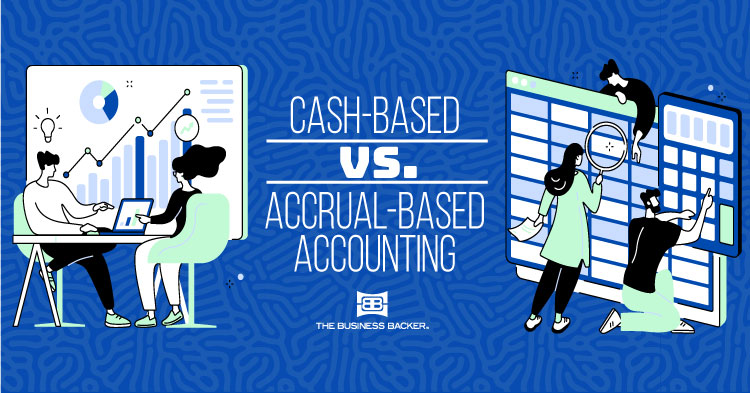What Is Cash-Based Accounting?
While it might not be your field of study, managing a small business’s finances is one of the most important responsibilities in the company. Whether you assign these duties or assume them yourself, it’s a good idea to familiarize yourself with accounting and bookkeeping basics.
The chosen method of accounting is one of the most fundamental aspects of a business’s finances. Read on to learn about cash-based and accrual-based accounting to help you decide the right method for your company.
What’s the Difference Between Cash-Based and Accrual-Based Accounting?
The main difference between cash-based and accrual-based accounting methods is the timing of the recorded payments and expenses. While it might seem like an insignificant distinction, a business’s accounting method can affect its cash flow, financial documents, taxable revenue and other fiscal matters.
What Is Cash-Based Accounting?
For cash-based accounting systems, income and expenses are only reported when money changes hands. In other words, you’d record money that goes in or out of your business at the time an invoice has been paid, as opposed to when you sent the invoice.
What Are Possible Benefits of Cash-Based Accounting?
A cash-based accounting system can help certain types of small businesses simplify bookkeeping management.
- Simplicity: Cash-based accounting systems only keep track of paid expenses and income when they’re received. It’s typically easier to manage a cash-based accounting system when compared to more complex methods.
- Cash flow tracking: You can see how much cash you have on hand at any time since it’s tracked through this accounting system.
- Potential savings: Cash-based accounting may help prevent businesses from paying taxes on income that has not yet been received. For example, a company using cash-based accounting sends an invoice to a vendor in November, but doesn’t get paid until several months into the new year, so their annual income from the previous year would not reflect the invoiced revenue.
What Are Possible Downsides of Cash-Based Accounting?
Due to its simplicity, cash-based accounting may have some reporting deficiencies for certain types of businesses.
- Inventory tracking: If you have remaining product/inventory from one month to the next, or one year to the next, a cash-based accounting system might complicate revenue tracking, budgeting or related matters.
- Reporting lacks account receivable/payable: Cash-based accounting systems generally do not record specific dates of sales or expenses. This can make it more difficult to track unpaid invoices or expenses.
What Is Accrual-Based Accounting?
Businesses that use an accrual-based accounting method record transactions, both expenses and income, on the dates each were incurred by the business. In other words, a business records a transaction on a date it sends out an invoice, as opposed to when the recipient actually pays the bill.
What Are Possible Benefits of Accrual-Based Accounting?
This more complex accounting system is commonly used by businesses with advanced reporting needs, such as larger businesses, publicly traded companies and industries like manufacturing or retail. Some benefits of the accrual-based accounting system may include:
- More accurate bookkeeping: This method is generally a better indicator of your business’s financial performance over time, as it provides a clear snapshot of month-by-month revenue and expenses.
- Preferred by some business partners: Since accrual-based accounting can provide a more accurate financial snapshot, it may be preferred by companies such as small business lenders and prospective partners. Additionally, publicly traded companies generally use accrual-based accounting.
What Are Possible Downsides of Accrual-Based Accounting?
Though this process may be required for more advanced bookkeeping needs, accrual-based accounting has some potential downsides.
- Cash flow must be tracked separately: Accrual-based accounting doesn’t include cash flow tracking, so bookkeepers and accountants using this method must manage this data separately.
- More time-intensive: This method involves the management of additional accounts, such as receivable and payable expenses, so some entrepreneurs may prefer to consult with financial professionals to help set up and/or manage their books using this system.
What Is an Example of Cash-Based Accounting vs. Accrual-Based Accounting?
A business sends out a $100 invoice to a customer. The business’s accounting system will dictate the timing of the payment receipt. For example, if it were a cash-based accounting system, the business would not record the $100 payment until it was actually received from the customer. On the other hand, a business using an accrual-based accounting method would record revenue from the $100 immediately.
What Accounting Method Should My Business Use?
The IRS requires small business to consistently file taxes using either cash-based or accrual-based accounting. Generally, specific paperwork is required to change a business’s accounting system after it’s been set up. While businesses may choose other accounting methods to suit their reporting needs, they must use the appropriate tax-filing system for their situation.
Larger, more complex operations, and/or companies that do business in multiple states generally have more complex accounting needs. As such, these types of businesses may be better suited for the accrual-based accounting method. Additionally, the IRS requires corporations (excluding S corporations) that meet or exceed $25 million in gross annual sales to use accrual-based accounting.
The information in this article is provided for educational and informational purposes only, without any express or implied warranty of any kind, including warranties of accuracy, completeness or fitness for any particular purpose. The information in this article is not intended to be and does not constitute financial, legal or any other advice. The information in this article is general in nature and is not specific to you the user or anyone else.





